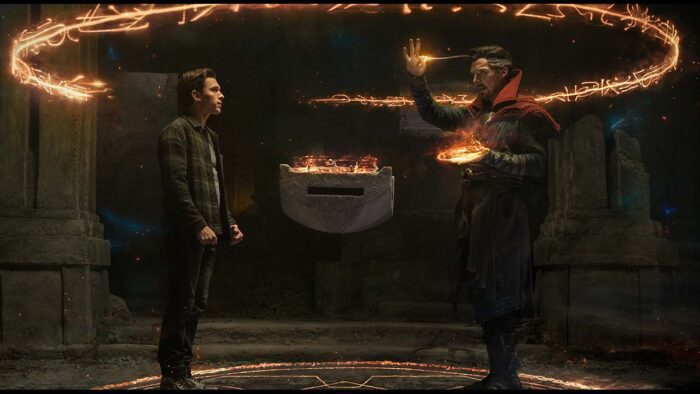There’s a golden rule I promise myself whenever I’m about to see a movie I’m excited about; don’t picture the film in your head. Doing so will lead to almost guaranteed disappointment. As Zendaya’s MJ says in the film, “if you have no expectations, you’ll never be disappointed.” Spider-Man: No Way Home is one of the only times in my life where the perfect film I’m trying to block out of my conscious was screened in reality.
During Spider-Man: Far From Home’s final moments, a dying Mysterio (Jake Gyllenhaal) frames Peter Parker (Tom Holland) for his death, revealing his identity to the world. With the cat out of the bag, Peter’s life is in shambles. Everywhere he goes, there’s chaos. Whatever form of safety Peter had for his loved ones is gone with him being ousted. To deal with such a catastrophe, Pete seeks the help of Dr. Strange (Benedict Cumberbatch). The solution to Pete’s problem is a spell that will cause everyone to forget Peter Parker’s existence. During the spell, Pete keeps trying to change things, tampering with the spell’s effects causing it to fail and the multiverse to open, which is when things get dicey.

No Way Home is scaled back despite the ambitious multiversal premise, focusing on Spider-Man’s inner conflict with rage and compassion. If Sam Raimi’s Spider-Man films were about forgiveness, then Jon Watts’ Spider-Man: No Way Home is about redemption. Raimi, more than anyone, contained the very heart that made Spider-Man the friendly neighborhood kid who’s a street-level hero at his very core.
What separates Spider-Man from his Avengers compatriots is his empathy. Peter Parker believes in the good that people have. When the villains of the multiverse pop in, Spidey has an opportunity to save them. Underneath the masks of soulless monsters who know how to press thier opponent’s buttons are brilliant scientists who want to use their knowledge for good. Breaking these characters free from their dark halves is a close to impossible task that only Peter would take on.
Dr. Otto Octavius (Alfred Molina) and his early 2000s compatriot have fascinating character arcs throughout the picture – unfortunately they’re not alone and these others, could easily have been cut from the film entirely – the narrative arc these two characters hold was more than enough to keep the story’s thematic elements moving forward without over-packing the plot. NWH is close to being structurally flawless. How it weaves its web between humor and drama is mostly seamless. The jokes, in the beginning, do have that Marvel kink to them that can be cringeworthy, but those uncomfortable moments are scarce. When the picture kicks into its third act, the film becomes surprisingly dark, and the sentimentality doesn’t hit a single false beat.
The nostalgia the multiverse produces is effective beyond the shallowness of a proton pack or resurrection of Emperor Palpatine. The reboots of today are more about toys than people. Bill Murray slaps on his old uniform to get his paycheck, much like an unshaven Harrison Ford reluctantly appearing in The Rise of Skywalker for the same reason.
I’m no mind reader, but I’m stunned how (almost) every cameo shown in the film’s advertising, doesn’t exist for pure commercialism. Spider-Man wants to save the very men who are a threat to humanity. Existentially he wants to save himself. Peter Parker, like everyone, is a flawed human being whose capable of harm if not tamed. The “villains” aren’t bad guys, they’re ghosts of men Peter can redeem since in a way, they’re no different than him. They sadly stumbled upon the wrong path. Alas Uncle Ben’s “with great power comes great responsibility” has significance.

Time heals. Tom Holland’s finale in this Spider-Man trilogy has some closure for the souls its trying to save. Metaphorically, the demons Spidey faces is a heartfelt representation of fan culture. Fans carry beloved franchises extremely close to their hearts. When they see it mistreated, they lash out. Like the prequels being nostalgized through Dave Filoni’s work on The Clone Wars, time mends the wounds of Spider-Man’s cinematic saga.
What makes any film work is emotional relatability; whether it’s on the sands of Tatooine or the streets of Gotham, it’s who the film is about that makes a narrative work. You can have a crammed movie like Spider-Man 3 that gets lost in its subplots, or you can have Batman Begins, where despite its countless villains, the narrative is solely focused on Bruce Wayne/Batman. Even with the vast supporting cast, Spider-Man: No Way Home is Tom Holland’s film. His performance is terrific, filled with the range I’d like to see this particular character show more often. When he gets to a dark place, it’s legitimately intimidating. More of this from Tom please.
The heart of Spider-Man is back. With Tom Holland signed on for three more films, perhaps audiences will at last see our protagonist age beyond college. No Way Home has genuine moments of beauty that had me thinking, “I can’t believe it’s this good.” I haven’t had a feeling coming out from a blockbuster for a very long time. The unexpectedly bittersweet note NWH ends on is enough to close Tom’s arc for on for a while giving his character some needed R&R. The filmmakers involved with this picture respect the intelligence of its audience. They know that a movie big or small works not when it’s loaded with cameos, but filled with substance.




